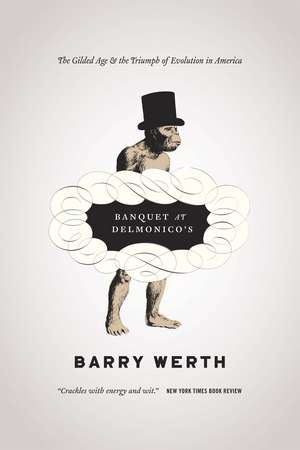Banquet at Delmonico's: The Gilded Age and the Triumph of Evolution in America
Autor Barry Werthen Limba Engleză Paperback – apr 2011
Preț: 101.31 lei
Preț vechi: 148.26 lei
-32% Nou
Puncte Express: 152
Preț estimativ în valută:
19.39€ • 21.07$ • 16.30£
19.39€ • 21.07$ • 16.30£
Carte indisponibilă temporar
Doresc să fiu notificat când acest titlu va fi disponibil:
Se trimite...
Preluare comenzi: 021 569.72.76
Specificații
ISBN-13: 9780226893846
ISBN-10: 0226893847
Pagini: 400
Dimensiuni: 152 x 229 x 25 mm
Greutate: 0.48 kg
Editura: University of Chicago Press
Colecția University of Chicago Press
ISBN-10: 0226893847
Pagini: 400
Dimensiuni: 152 x 229 x 25 mm
Greutate: 0.48 kg
Editura: University of Chicago Press
Colecția University of Chicago Press
Notă biografică
Barry Werth is an award-winning journalist whose articles have been published in the New Yorker, New York Times Magazine, and GQ. He is the author of several books, including The Scarlet Professor: Newton Arvin: A Literary Life Shattered by Scandal and 31 Days: The Crisis That Gave Us the Government We Have Today.
Cuprins
Introduction
Principal Characters
Prologue
New York, November, 1882
Chapter One
Cambridge, 1871
Chapter Two
New haven, 1872
Chapter Three
New York, 1873
Chapter Four
New Haven, 1874
Chapter Five
Brooklyn, 1875
Chapter Six
Washington, 1876
Chapter Seven
Baltimore,1877
Chapter Eight
Brooklyn, 1878
Chapter Nine
French Riviera, 1879
Chapter Ten
Washington, 1880
Chapter Eleven
New York, 1881
Chapter Twelve
New York, 1882
Epilogue
Acknowledgments
Bibliography
Notes
Index
Principal Characters
Prologue
New York, November, 1882
Chapter One
Cambridge, 1871
Chapter Two
New haven, 1872
Chapter Three
New York, 1873
Chapter Four
New Haven, 1874
Chapter Five
Brooklyn, 1875
Chapter Six
Washington, 1876
Chapter Seven
Baltimore,1877
Chapter Eight
Brooklyn, 1878
Chapter Nine
French Riviera, 1879
Chapter Ten
Washington, 1880
Chapter Eleven
New York, 1881
Chapter Twelve
New York, 1882
Epilogue
Acknowledgments
Bibliography
Notes
Index
Recenzii
“Readers who want an engaging story…will find Banquet at Delmonico’s to be a literary treat.”—Boston Globe
“Histories of ideas are rarely page turners, but Werth has done the trick.”—Kirkus, starred review
“This apt fusion of form and content makes for a surprisingly suspenseful and fast-paced story….Banquet at Delmonico’s crackles with energy and wit. . . . Werth is a gifted writer, and his subject is especially important in our current economic crisis.”—New York Times Book Review
“What Werth has done, cleverly, in addition to drawing Spencer out from behind Darwin’s shadow . . . is to create a narrative double helix of his own.”—Los Angeles Times
“On one level, the book is a study of how ideas are understood, reworked, mangled and applied to society: Banquet at Delmonico's is like a racier version of The Metaphysical Club, Louis Menand's worthy study of the origins of pragmatism. But… Werth also offers a portrait of how ideas can be transformed if their originators vacate the public sphere."—Nation
"In this fascinating study, Werth . . . shows how the idea of social Darwinism, as codified by Herbert Spencer, took hold in the United States, underpinning the philosophy of the Gilded Age's social, cultural and financial elite. Anchoring his story with the stunning Delmonico's celebration honoring the departure of Spencer after a triumphant tour of the United States in 1882, Werth rightly depicts the frame of reference Spencer left behind as a predecessor to Ayn Rand's philosophy of Objectivism, with its focus on unrestrained self-interest and unbridled capitalism. As Werth explains, Spencer's interpretation of Darwinism won the approval of not only robber barons but also prominent religious, scientific and political leaders. Henry Ward Beecher, writes Werth, used the most acclaimed pulpit in America to preach the gospel of evolution; that is, that it was God's way to... sort the worthy from the wretched. This was survival of the fittest, which Spencer and his followers saw as not only just but necessary. Thus, Werth elegantly reveals a firm philosophical foundation for all the antilabor excesses of the Industrial Age."
“Histories of ideas are rarely page turners, but Werth has done the trick.”—Kirkus, starred review
“This apt fusion of form and content makes for a surprisingly suspenseful and fast-paced story….Banquet at Delmonico’s crackles with energy and wit. . . . Werth is a gifted writer, and his subject is especially important in our current economic crisis.”—New York Times Book Review
"In 1882 the U.S. was in the midst of what Mark Twain called the 'Gilded Age'—great prosperity at the top of the social scale, surrounded by poverty among the masses in teeming industrial centers. At the same time, Darwin’s theories of natural selection and 'survival of the fittest' had taken flight; they were frequently used (or abused) to explain and justify the wide disparities in wealth. In that year a dinner party was held at the swanky Delmonico’s restaurant in New York to honor Herbert Spencer, the British philosopher and influential promoter of 'social Darwinism.' Werth uses this gathering as a launching pad to describe the exciting and tumultuous times the attendees lived through as well as the lives and careers of some of the chief movers and shakers of the age. There are finely drawn vignettes of Spencer, the anti-Darwinian; Louis Agassiz, the staunch Christian; and Darwinist Asa Gray, the political reformer Carl Schurz, and many others. This is an interesting and well-done work that provides a snapshot of our nation engulfed in great political, intellectual, and social change."
“What Werth has done, cleverly, in addition to drawing Spencer out from behind Darwin’s shadow . . . is to create a narrative double helix of his own.”—Los Angeles Times
“On one level, the book is a study of how ideas are understood, reworked, mangled and applied to society: Banquet at Delmonico's is like a racier version of The Metaphysical Club, Louis Menand's worthy study of the origins of pragmatism. But… Werth also offers a portrait of how ideas can be transformed if their originators vacate the public sphere."—Nation
